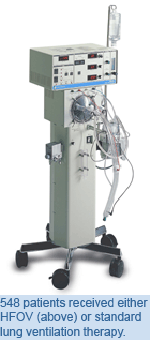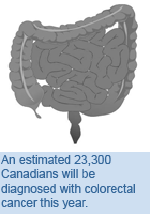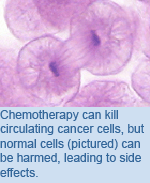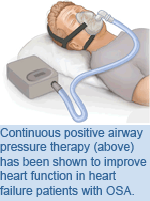
January 2013
Welcome to Net Results EXPRESS
Net Results EXPRESS (NRx) is an award-winning, monthly e-newsletter highlighting medical and scientific breakthroughs, major grants and honours awarded, and other research-related events at UHN. Through NRx you can read about ongoing research at our five research institutes, the Ontario Cancer Institute (OCI), the Toronto General Research Institute (TGRI), the Toronto Western Research Institute (TWRI), the Toronto Rehabilitation Institute (TRI) and the Techna Institute for the Advancement of Technology for Health (TECHNA). We hope you will find this newsletter informative and helpful. If you have feedback or questions, please contact www@uhnresearch.ca. Christopher J. Paige, PhD, FCAHS |
Respiration: Testing a New Model to Treat Lung Injury
A multicentre international clinical trial, led by TWRI Scientist Dr. Niall Ferguson, unexpectedly found that mortality rates were higher in ARDS patients treated with HFOV than in patients receiving conventional ventilation treatment. In addition, HFOV-treated patients had higher mean airway pressures and were treated more often with vasoactive and sedative drugs. One possible explanation for the contrast from prior studies may be the small sample sizes and outdated ventilation strategies they used, compared with best current conventional ventilation used as the control group in this study. Dr. Ferguson concludes, “Our results raise serious concerns about the early use of HFOV, which does not reduce mortality and may be harmful in the management of ARDS in adults.” High-frequency oscillation in early acute respiratory distress syndrome. Ferguson ND, Cook DJ, Guyatt GH, Mehta S, Hand L, Austin P, Zhou Q, Matte A, Walter SD, Lamontagne F, Granton JT, Arabi YM, Arroliga AC, Stewart TE, Slutsky AS, Meade MO, the OSCILLATE Trial Investigators and the Canadian Critical Care Trials Group. New England Journal of Medicine. 2013 January 22. [Pubmed abstract] This work was supported by the Canadian Institutes of Health Research. |
Cancer: New Discovery for Tumour Growth
By tracking individual cancer tumour cells, Dr. Dick found that only a small subset of cells contributed to cancer growth. Specifically, some cells kept the cancer growing for long time periods while other cells lay dormant before being activated. When chemotherapy was applied, it was observed that the dormant cells were not eliminated by drug treatment but were instead activated, causing the tumour to grow again. These cancer cells that survived therapy were genetically similar to the cancer cells initially responsible for tumour growth and responsive to treatment, suggesting that cellular factors not linked to genetic mutation can be responsible for therapy failure. “This is a paradigm shift that shows research needs to focus on the biological properties of cells,” explains Dr. Dick. “Targeting the biology and growth properties of cancer cells could expand the repertoire of usable therapeutic agents and provide better outcomes for patients.” Variable clonal repopulation dynamics influence chemotherapy response in colorectal cancer. Kreso A, O’Brien CA, van Galen P, Gan OI, Notta F, Brown AMK, Ng K, Ma J, Wienholds E, Dunant C, Pollett A, Gallinger S, McPherson J, Mullighan CG, Shibata D, Dick JE. Science. 2012 December 13. [Pubmed abstract] This work was supported by Genome Canada through the Ontario Genomics Institute, the Ontario Institute for Cancer Research, the Canadian Institutes for Health Research, the Princess Margaret Cancer Foundation, the Canada Foundation for Innovation, the Ontario Ministry of Health and Long-Term Care and J. Dick’s Premier’s Summit Award. J. Dick is also a Tier 1 Canada Research Chair in Stem Cell Biology. |
Cancer: Refining Treatment of Oropharyngeal Cancer
To answer this question OCI Clinician-Scientist Dr. Brian O’Sullivan and his colleagues carried out a risk analysis of OPC patients treated from 2001- 2009, and classified them into low and high risk HPV-positive subgroups. The low risk subgroup seemed to be curable with radiotherapy alone but in the high risk subgroup chemotherapy was necessary to reduce the spread of cancer to distant organs in the body. This important observation will guide future confirmatory trials to refine the treatment of HPV-positive OPC. Dr. O’Sullivan explains, “While the deintensification of treatments in HPV-positive OPC may, in some cases, represent a way of maximizing the benefits of therapies while reducing harm, this approach must be considered with caution when a risk of distant metastasis exists.” Deintensification candidate subgroups in human papillomavirus-related oropharyngeal cancer according to minimal risk of distant metastasis. O'Sullivan B, Huang SH, Siu LL, Waldron J, Zhao H, Perez-Ordonez B, Weinreb I, Kim J, Ringash J, Bayley A, Dawson LA, Hope A, Cho J, Irish J, Gilbert R, Gullane P, Hui A, Liu FF, Chen E, Xu W. Journal of Clinical Oncology. 2013 January 7. [Pubmed abstract] This research was supported by The Princess Margaret Hospital Foundation. |
Obesity: Protecting the Heart from a High Fat Diet
TGRI Director and Senior Scientist Dr. Mansoor Husain investigated how low doses of liraglutide—much lower than those used in weight loss studies—affect the heart in a preclinical model of obesity. The research team found that after seven days of treatment, markers of inflammation were reduced and measures of heart function were improved, including a reduction in blood pressure. Liraglutide was found to block the toxic effects of excess fat in isolated heart cells. This suggested that the drug’s protective effects were due to a direct mechanism of action on the heart rather than an effect on insulin, blood sugar or processes in other organs. A glucagon-like Peptide-1 analog reverses the molecular pathology and cardiac dysfunction of a mouse model of obesity. Noyan-Ashraf MH, Shikatani EA, Schuiki I, Mukovozov I, Wu J, Li RK, Volchuk A, Robinson LA, Billia F, Drucker DJ, Husain M. Circulation. 2013 January 1. [Pubmed abstract] This work was supported by the Heart and Stroke Foundation of Ontario, the Canadian Institutes of Health Research and by Novo Nordisk Inc. D. Drucker is a Tier 1 Canada Research Chair in Regulatory Peptides, A. Volchuk holds a Tier 2 Canada Research Chair in Diabetes and M. Husain is recipient of a Career Investigator Award of the Heart and Stroke Foundation of Ontario. |
Cardiology: Effect of Sleep Apnea on Heart Function
To better understand these conditions in heart failure patients, TRI and TGRI Senior Scientist Dr. Douglas Bradley and TGRI Senior Scientist Dr. John Floras examined the effects of CSA and OSA on stroke volume—the amount of blood pumped by the left ventricle of the heart in one contraction and an important measurement of cardiac function. In an overnight study of 40 heart failure patients, a decrease in stroke volume was observed during OSA events. However, stroke volume was slightly increased during CSA events. “Decreased stroke volume can lead to a number of cardiovascular events, like chest pains or worsening heart failure, providing a possible explanation as to how OSA can increase the risk of death in heart failure patients,” says Dr. Bradley. These findings also suggest greater potential for improvement of cardiovascular function through treatment of OSA than through treatment of CSA, in heart failure patients. Differing effects of obstructive and central sleep apneas on stroke volume in patients with heart failure. Yumino D, Kasai T, Kimmerly D, Amirthalingam V, Floras JS, Bradley TD. American Journal of Respiratory and Critical Care Medicine. 2012 December 13. [Pubmed abstract] This work was supported by the Canadian Institutes of Health Research and the Heart and Stroke Foundation of Ontario. Dr. Floras is a Tier I Canada Research Chair in Integrative Cardiovascular Biology. |
Genetics: Understanding How Drugs Affect the Entire System
The researchers combined datasets from previously published experiments that studied how different yeast mutations responded to individual drugs. Termed ‘NetwoRx’, a database of 5924 genes and 466 drugs was created, allowing for extensive data analysis to investigate drug effects at the system level. Users can search by drug name and see which specific genes are affected or, conversely, input a set of genes they want to study and retrieve every drug that targets them. This method of network analysis holds great potential for providing data quickly and affordably. Dr. Jurisica adds, “Integrative computational methods that mine databases such as NetwoRx can help researchers understand the multi-modal effects of drug treatment and accelerate the identification and development of new therapeutics.” NetwoRx: connecting drugs to networks and phenotypes in Saccharomyces cerevisiae. Fortney K, Xie W, Kotlyar M, Griesman J, Kotseruba Y, Jurisica I. Nucleic Acids Research. 41(D1): D720-7, 2013. [Pubmed abstract] This work was supported by the Ontario Research Fund, Canadian Institutes of Health Research, Canada Foundation for Innovation and the Ontario Ministry of Health and Long-Term Care. Dr. Jurisica is a Tier 1 Canada Research Chair in Integrative Cancer Informatics. |
![]()
 The Canada Foundation for Innovation (CFI) announced new funding for a UHN-led project, which will provide $3.3M in new infrastructure support.
The Canada Foundation for Innovation (CFI) announced new funding for a UHN-led project, which will provide $3.3M in new infrastructure support.Led by OCI Senior Scientist Dr. John Dick a team of OCI Scientists including Dr. Linda Penn, Tak Mak, Mark Minden, Igor Jurisica, Ben Neel and Cheryl Arrowsmith, OCI Scientist Dr. Mathieu Lupien, OCI Clinician-Scientist Dr. Lillian Siu and CAMH Scientist Dr. Art Petronis, this group will receive support to establish Canada’s first “Centre for Cancer Epigenomics”. Supported through CFI’s Leading Edge Fund, this project builds on previous CFI investments to create a cutting-edge sequencing and informatics facility that will examine the epigenomic basis of cancer for the advancement of personalized cancer medicine.
 TWRI is pleased to announce the appointment of Dr. Donald Weaver as its new Director, effective July 1, 2013. Dr. Weaver has an outstanding and exceptional research background—he is a practicing neurologist with a sub-specialty interest in epilepsy and dementia. His research focuses on the application of computer-assisted drug design in discovery and development of novel therapeutics for neurological disorders.
TWRI is pleased to announce the appointment of Dr. Donald Weaver as its new Director, effective July 1, 2013. Dr. Weaver has an outstanding and exceptional research background—he is a practicing neurologist with a sub-specialty interest in epilepsy and dementia. His research focuses on the application of computer-assisted drug design in discovery and development of novel therapeutics for neurological disorders.Dr. Weaver also has a strong interest in knowledge translation and commercialization of research and is an advocate for the creation of “micropharma” companies within the academic sector for effective drug development. He is coming to UHN from Dalhousie University where he served as the Director of Research for the Department of Medicine. Dr. Weaver currently holds a Tier 1 Canada Research Chair in Neuroscience and the Sobey Chair in Alzheimer’s Disease Research. He is a past winner of the Prix Galien Canada Award (2009) and the Jonas Salk Award (2011).
 UHN's 2012 Research Report is now available. This year's report, entitled "Connected", focuses on the multitude of connections that exist at UHN—connections that are essential to its role as a living laboratory for improving health.
UHN's 2012 Research Report is now available. This year's report, entitled "Connected", focuses on the multitude of connections that exist at UHN—connections that are essential to its role as a living laboratory for improving health.The report features top UHN research from 2012, combined with connectivity maps to illustrate local, national and global success stories. Also highlighted are the past year’s top research events, prestigious investigator awards, UHN’s Foundations, as well as feature articles on Techna, TRI’s cutting edge iDAPT facility and marketplace innovation at UHN.
To download this year's report, please click here.
The award was presented to Dr. Tymianski at the 2012 Canadian Stroke Congress in Calgary. The Congress provides an important forum for exchanging ideas, collaborating and learning of innovation in stroke prevention, treatment and recovery.
Feedback
Net Results EXPRESS is brought to you by UHN Research Communications. We hope you have enjoyed receiving this message. If you have any feedback, please email www@uhnresearch.ca.
To access archived issues of Net Results EXPRESS, visit uhnresearch.ca/news/netresultsexpress
Some images adapted from the image archives of stock.xchng.ca, Wikimedia Commons and Wikipedia. Acute respiratory distress syndrome (ARDS) is a life-threatening condition in which the lungs are unable to adequately absorb oxygen and release carbon dioxide. Mechanical ventilation of the lungs has been the standard form of ARDS supportive treatment; however, repetitive overstretching or collapse of the lung can cause inflammation, organ failure and death. Previous studies have suggested that the delivery of very small volumes of oxygen at very high rates, in the form of high-frequency oscillatory ventilation (HFOV), could improve oxygen delivery and survival.
Acute respiratory distress syndrome (ARDS) is a life-threatening condition in which the lungs are unable to adequately absorb oxygen and release carbon dioxide. Mechanical ventilation of the lungs has been the standard form of ARDS supportive treatment; however, repetitive overstretching or collapse of the lung can cause inflammation, organ failure and death. Previous studies have suggested that the delivery of very small volumes of oxygen at very high rates, in the form of high-frequency oscillatory ventilation (HFOV), could improve oxygen delivery and survival.
 A study by OCI Senior Scientist Dr.
A study by OCI Senior Scientist Dr.  Human papillomavirus (HPV) can cause oropharyngeal cancer (OPC), a cancer of the throat. The severity OPC is impacted by HPV status: HPV-negative cancer causes poor outcomes while HPV-positive cancer leads to much better survival. Treatment of OPC usually involves radiotherapy with or without chemotherapy; however, it is unknown whether patients with low risk HPV-positive cancer would benefit from omission of chemotherapy to minimize harmful side effects.
Human papillomavirus (HPV) can cause oropharyngeal cancer (OPC), a cancer of the throat. The severity OPC is impacted by HPV status: HPV-negative cancer causes poor outcomes while HPV-positive cancer leads to much better survival. Treatment of OPC usually involves radiotherapy with or without chemotherapy; however, it is unknown whether patients with low risk HPV-positive cancer would benefit from omission of chemotherapy to minimize harmful side effects.
 Obesity is a growing problem in Canada. Among its many effects on the body, obesity is linked to heart disease, high blood pressure and low-grade inflammation. Liraglutide, an injectable treatment for type-2 diabetes, may also reduce blood pressure and help obese adults reduce their body weight.
Obesity is a growing problem in Canada. Among its many effects on the body, obesity is linked to heart disease, high blood pressure and low-grade inflammation. Liraglutide, an injectable treatment for type-2 diabetes, may also reduce blood pressure and help obese adults reduce their body weight. Central sleep apnea (CSA) and obstructive sleep apnea (OSA) are common in patients with heart failure and may increase the risk of death. CSA occurs when you stop breathing during sleep because the brain temporarily stops sending signals to the muscles that control breathing, while OSA involves interrupted breathing during sleep because the throat is narrowed or blocked.
Central sleep apnea (CSA) and obstructive sleep apnea (OSA) are common in patients with heart failure and may increase the risk of death. CSA occurs when you stop breathing during sleep because the brain temporarily stops sending signals to the muscles that control breathing, while OSA involves interrupted breathing during sleep because the throat is narrowed or blocked.